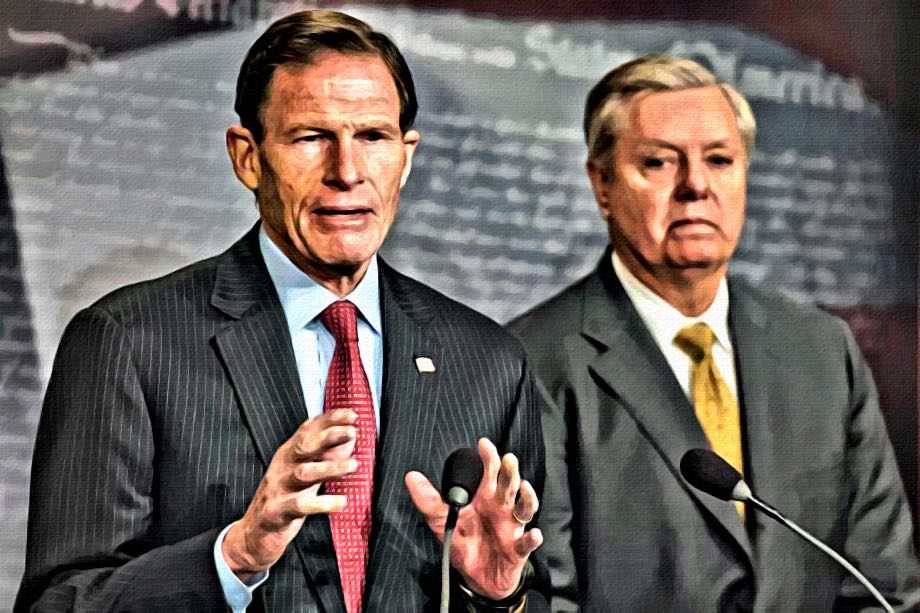Politicians and pundits need to get real after the mass-shooting spree in El Paso by avoiding killer-conspiracy theories and advancing gun safety. To paraphrase Trey Gowdy (R-SC), the right to life is the primary right from which all other rights emanate. In his words, “what good is the right to free speech if you’re dead?” In his view, gun-safety opponents must stop hiding behind their interpretation of the 2nd amendment.
Senators Graham (R-SC) and Blumenthal (D-CT) have proposed a bill that grants federal money to states that pass red flag laws to prevent gun ownership by people who pose a risk of gun violence. Thereafter, a judge can hand down an “extreme risk protection order” to an at-risk person after adequate due process.
A red-flag law is both constitutional and effective. Former DOJ lawyer Andrew McCarthy cites “many circumstances short of a criminal conviction that justify the denial of firearm rights.” He is referring to section 922 of the penal code: it is a felony to transfer a gun to someone who:
- Is under indictment
- Is a fugitive from justice – even if not convicted
- Is a drug addict
- Has been adjudicated a “mental defective”
- Is an illegal alien
- Is a legal alien admitted on a non-immigrant visa
- Has been dishonorably discharged from the armed forces
- Has renounced his (or her) US citizenship
- Is subject to a restraining order
Section 922 is both reasonable and upheld by the courts; therefore, red-flag laws are sure to win bipartisan support – which, of course, means the NRA will oppose the bill. I bet they lose this battle, because Mitch McConnell wants to bring it to a vote and President Trump has promised to sign it. It is a win-win compromise.
First, it does not infringe upon a citizen’s right to gun ownership. The US Constitution protects the right to self defense as a “natural right” that those who govern cannot give or deny. It’s obvious a single mom might need a gun as defense against an abusive ex-lover, or the owner of a rural all-night gas station might need defense against armed robbery. However, while the right is protected, it is not absolute.
Gun-law opponents should know that, after adequate due process, the government can deny or regulate constitutional rights in some instances. To wit, the eighth amendment guarantees excessive bail shall not be required of the accused, but judges routinely deny bail to flight risks and persons that endanger the community.
If the NRA believes guns don’t kill…people do, they should support red-flag laws that would prevent gun ownership to three probable perpetrators: (1) individuals considered mentally at risk of violence to self or others, (2) persons associated with drug cartels and gang violence, and (3) former domestic partners guilty of physical abuse.
36,000 Americans die by gun shot annually. 22,274 (61%) are gun-suicides, 8,900 (25%) are gang-related, and 760 (2%) result from domestic violence (source: CDC). Mass-shooting deaths, while capturing the headlines, are not even 1% of America’s gun deaths – but I suspect there is a red flag for these gun deaths as well.
Everyone in Washington supports background checks; so, psychotherapists, gang task forces, and domestic-violence courts need to work with the FBI, DEA and DHS to red-flag probable perpetrators with a goal of zero-tolerance for gun possession (a felony with prison sentence). Yes, Americans have the right to bear arms, but not the right to buy a 44 magnum with fries at the drive-thru window.
NRA membership includes many responsible gun owners, who always buy state hunting licenses, never leave a loaded gun at home with school-aged boys, or sneak a loaded gun through TSA security. Supporting red-flag laws is a mere extension of such responsible behavior. Gun-rights supporters can with good conscience support this bipartisan proposal, because the optics of opposition is a bad-bad look.
